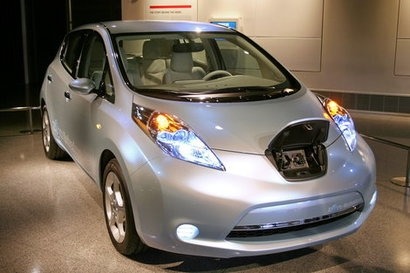
Transport Secretary Patrick McLoughlin MP announced the winners of the Go Ultra Low City Scheme which was created to support the take-up of plug-in electric cars across the UK. The winning cities, Bristol, Nottingham, Milton Keynes and London, proposed a number of initiatives to support greener vehicles as part of the government competition. Each city will deliver a rollout of cutting edge technology, such as rapid charging hubs and street lighting that doubles as charge points, along with a range of other innovative proposals. These include extra local privileges for plug-in car owners, such as access to bus lanes in city centres and 25,000 extra parking spaces, saving commuters as much as £1,300 per year.
The proposals will support the UK’s thriving green vehicle sector, improve air quality in urban hotspots and help the government to meet its emissions reduction targets.
“These Go Ultra Low Cities have proposed exciting, innovative ideas that will encourage drivers to choose an electric car” said Mr McCloughlin. “I want to see thousands more greener vehicles on our roads and I am proud to back this ambition with £40 million to help the UK become international pioneers of emission cutting technology.”
Mr McCloughlin added that the UK is a world leader in the uptake of low emission vehicles and that the government’s long-term economic plan is to invest £600 million by 2020 to improve air quality, create jobs and achieve the goal of every new car and van in the UK being ultra-low emission by 2040.
London has been awarded £13 million to create ‘Neighbourhoods of the future’ prioritising ultra-low emission vehicles (ULEVs) in several boroughs across the capital. The proposals include over a dozen streets in Hackney going electric with charging infrastructure such as car-charging street lighting, while Harrow will develop a low emission zone offering parking and traffic priority to owners of plug-in vehicles. Westminster Council already provides free parking for ULEVs and London’s proposal aims to deliver 70,000 ULEVs by 2020 and almost a quarter of a million by 2025.
Milton Keynes will receive £9 million to open a city centre Electric Vehicle Experience Centre – a ‘one-stop shop’ that will provide consumer advice and short-term vehicle loans. The city is also proposing to open up all 20,000 parking bays for free to EVs and co-brand bus lanes as low emission lanes, giving plug-in vehicles the same priority at traffic lights as local buses.
Bristol receives £7 million to offer residents free residential parking for ULEVs, access to 3 carpool lanes in the city, over 80 rapid and fast chargers across the city and a scheme encouraging people to lease a plug-in car for 4 weeks to help them better understand the range of benefits that EVs can bring.
Nottinghamshire and Derby will use £6 million funding to install 230 chargepoints and offer ULEV owners discount parking and access to over 13 miles of bus lanes along key routes across the city. The investment will also pay for a new business support programme letting local companies ‘try before they buy’.
The scheme is also providing £5 million of development funding for specific initiatives in Dundee, Oxford, York and the north-east to help them play their part in kick-starting a country-wide clean motoring revolution. New commuter charging hubs in Dundee will open up links across the region for plug-in vehicle owners, while solar-canopied park and ride hubs in York will help reduce air pollution in and around the city. The funding will also support highly-skilled jobs in the automotive industry by encouraging the sale of thousands of extra plug-in cars, many of which will be built and tested in the UK.
The Go Ultra Low Cities fund is just one element of a comprehensive £600 million package of measures from OLEV by 2020 which also includes £400 million of guaranteed money for individual plug-in car grants, investment in low emission buses and taxis, and research and development funding for innovative technology such as lighter vehicles and longer-lasting car batteries.
For additional information:

